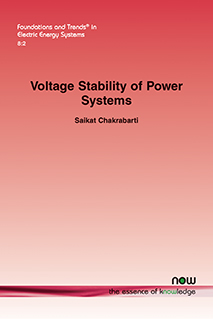Voltage Stability of Power Systems
By Saikat Chakrabarti, Department of Electrical Engineering, Indian Institute of Technology Kanpur, India, saikat.chakrabarti@gmail.com
Abstract
Voltage stability of a power system refers to its ability to maintain an acceptable level of bus voltages following a disturbance. With heavier loading and increasing penetration of renewable energy sources, voltage stability has become a very important concern in modern power systems. This monograph discusses different types of voltage stability problems based on their time-scales and the size of the disturbances. The basic concepts of voltage stability are explained with the help of a simple two-bus power system. Commonly used methods for voltage stability assessment are also discussed. Online monitoring of voltage stability is a prerequisite for taking any control actions to enhance the voltage stability of a system. Techniques for real-time monitoring of voltage stability using synchronized measurements from phasor measurement units are discussed.
The voltage stability of a system strongly depends on the characteristics of its loads. The impact of different types of static load models on long-term voltage stability of a system is investigated. In the event of ongoing voltage instability or potential voltage instability problems, corrective or preventive control actions are taken. Some of the commonly used control actions are discussed. The monograph also briefly highlights the impact of renewable energy-based converter interfaced generations on the voltage stability of power systems.
Voltage Stability of Power Systems
Voltage stability of a power system refers to its ability to maintain an acceptable level of bus voltages following a disturbance. With heavier loading and increasing penetration of renewable energy sources, voltage stability has become a very important concern in modern power systems. This monograph discusses different types of voltage stability problems based on their time-scales and the size of the disturbances. The basic concepts of voltage stability are explained with the help of a simple two-bus power system. Commonly used methods for voltage stability assessment are also discussed. Online monitoring of voltage stability is a prerequisite for taking any control actions to enhance the voltage stability of a system. Techniques for real-time monitoring of voltage stability using synchronized measurements from phasor measurement units are discussed.
The voltage stability of a system strongly depends on the characteristics of its loads. The impact of different types of static load models on long-term voltage stability of a system is investigated. In the event of ongoing voltage instability or potential voltage instability problems, corrective or preventive control actions are taken. Some of the commonly used control actions are discussed. The monograph also briefly highlights the impact of renewable energy-based converter interfaced generations on the voltage stability of power systems.
